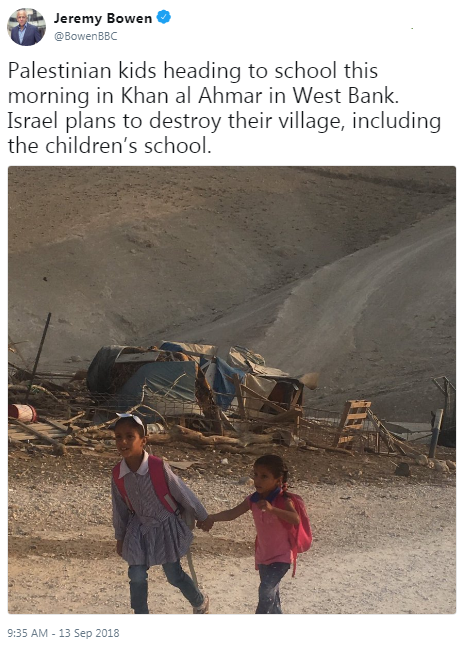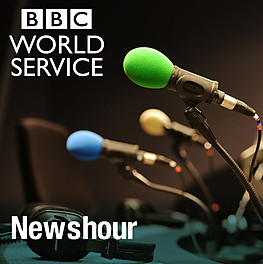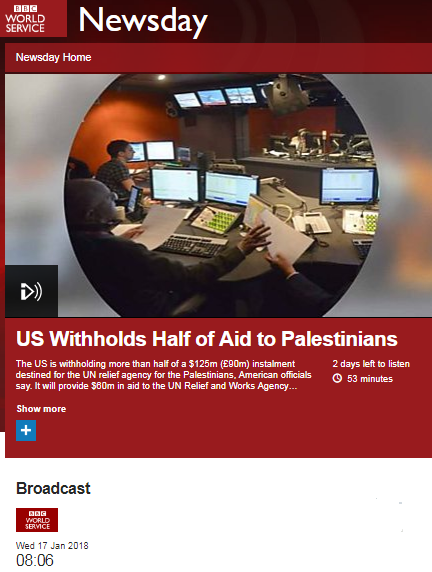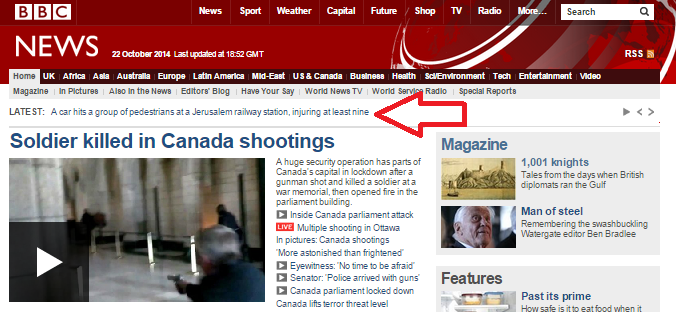On the morning of September 13th the BBC’s Middle East editor, Jeremy Bowen, sent a context-free tweet to his 170,000 followers.

Later that day, Bowen was to be found reporting on the same story in the afternoon edition of the BBC World Service radio programme ‘Newshour‘. Presenter Razia Iqbal introduced the item (from 45:06 here) as follows: [emphasis in italics in the original]
Iqbal: “Israel now, and security forces have today dismantled several shacks built by Palestinian protesters near Khan al Ahmar – the Bedouin village in the occupied West Bank which Israel has targeted for demolition. The village houses around 180 Bedouin but has become a symbol of something bigger and many European countries have urged Israel to stop the demolition. I’ve been speaking to our Middle East editor Jeremy Bowen. I asked him first to map out the geography of this village.”
Neither Iqbal nor Bowen bothered to adequately clarify to listeners that the structures removed on the morning of September 13th had actually been placed there deliberately just days earlier by Palestinian activists on behalf of the Palestinian Authority and were not part of the encampment itself.
Bowen commenced his report by failing to explain to listeners that what he described as “a road” is actually a major highway – Route 1.
Bowen: “There’s a road going down from Jerusalem – a steep road going downhill to the Dead Sea and to Jericho – and about a third of the way down that road, I suppose, there is this very small village Khan al Ahmar which is…it’s like a typical Bedouin settlement in that most of the dwellings there are shacks. And it’s just opposite an absolutely massive Jewish settlement called Ma’ale Adumim and so the argument being made by those on the Israeli side who say it’s got to go, they say that it’s unsafe, it’s in the wrong place, it shouldn’t be happening. People on the other side say they’re just trying to get rid of it so Israel can tighten its grip even further on that bit of territory.”
As can be seen on the UNOCHA produced map below, Khan al Ahmar is not located “just opposite” Ma’ale Adumim but further to the east and neither is it located in the area known as E1. Bowen did not bother to clarify to listeners that the location of the story is in Area C which, according to the Oslo Accords, is under Israeli control pending final status negotiations.

Nevertheless, Iqbal and Bowen went on to advance a false narrative about ‘contiguity’ that the BBC has been promoting for years.
Iqbal: “And that bit of territory, from the Palestinians’ perspective, is the idea from their point of view is that the Israelis want to cut off East Jerusalem from the West Bank, both of which the Palestinians seek for an independent state.”
Bowen: “Yeah. 1967 was when they captured East Jerusalem. Israel has built a string of settlements that essentially…ahm…ring East Jerusalem and separate it from the rest of the West Bank. Now there is one gap and the gap is quite a large area and this very small settlement is part of it. But Israel has a whole master plan for developing that particular gap – it’s an area known as E1 – and the argument the Israelis say for it is that this is their territory; that they need to develop their capital. And the argument against it is that if the Palestinians ever want a hope of some kind of contiguous state, then the fact that East Jerusalem – where there are many Palestinians – is ringed in by these settlements is going to make it next to impossible.”
Iqbal then went on to ask Bowen whether or not the Israeli Supreme Court had got its facts right.
Iqbal: “The Supreme Court rejected petitions to stop this from happening, siding with the authorities, and they said that the village was built without the required permits. That’s right, is it?”
Carefully avoiding inconvenient details of the story – such as the fact that the residents of Khan al Ahmar do not even claim to own the land on which they built illegal structures without planning permission – Bowen went on:
Bowen: “Yeah, it wasn’t built with permits and a lot of Palestinians build without permits because they can’t get permits. The whole planning process in Jerusalem and in the occupied territories – in East Jerusalem – is highly politicized. For Israel, once it was more about security but now I’d say it’s mostly about nation building and mostly about hanging on to territory. And planning reflects the wider needs of the state and they don’t encourage Palestinians to build, even though the Palestinian population is growing, and as a result of that Palestinians don’t get permits to build. They build anyway and then quite often those dwellings get knocked down.”
Iqbal: “This particular village, Khan al Ahmar, is a Bedouin village as you described. It affects just under 200 people but it’s symbolic of much more and that clearly has been recognised by European Union countries urging the Israeli government not to go ahead with the plan. Presumably that’s all going to fall on deaf ears.”
Obviously at that point it would have been appropriate for BBC audiences to have been told that the EU has also carried out illegal construction at that site and others in the vicinity. It would also have been helpful to listeners to know that under previous peace proposals, the area of E1 was set to remain under Israeli control.
Bowen: “Well they’ve urged the Israelis many times not to expand their settlement activities in the occupied territories and it’s always fallen on deaf ears. The only voice that was ever listened to by successive Israeli governments was the American one and the American voice now under the Trump administration is really quite different. I think under Obama, and before that under previous administrations as well, moves to develop this area E1 were always strenuously objected to on the grounds that it makes the pursuit of peace even more difficult. Just recently the American ambassador to Israel – close ally of Donald Trump – said he doesn’t know why Israel needs to ask permission of the US before it builds. So that, I think, is another green light for Israel to go ahead and push as much as it wants. Having said that, they are aware of international opinion and they’re sensitive to it. But that doesn’t change – based on history – the objective.”
Iqbal: “Complicated story – unpacked expertly there by our Middle East editor Jeremy Bowen speaking to me from Jerusalem.”
Yes – despite Bowen’s faulty geography, his amplification of the ‘contiguity’ myth and his failure to provide BBC audiences with the full background to this story (not least the fact that related court cases have been going on for nine years and the residents of Khan al Ahmar have been offered free plots of land on which to build homes nearby) and notwithstanding his erasure of the politically motivated interventions by the Palestinian Authority and the EU in this case, BBC World Service listeners were told that they had just heard an ‘expert’ explanation.
Related Articles:
Omission and imbalance in BBC report on ‘Bedouin village’
THE LA TIMES, THE BEDOUIN OF KHAN AL AHMAR AND ‘THEIR LAND’ (CAMERA)
MEDIA EMBRACE E1 FALSEHOODS (CAMERA)




